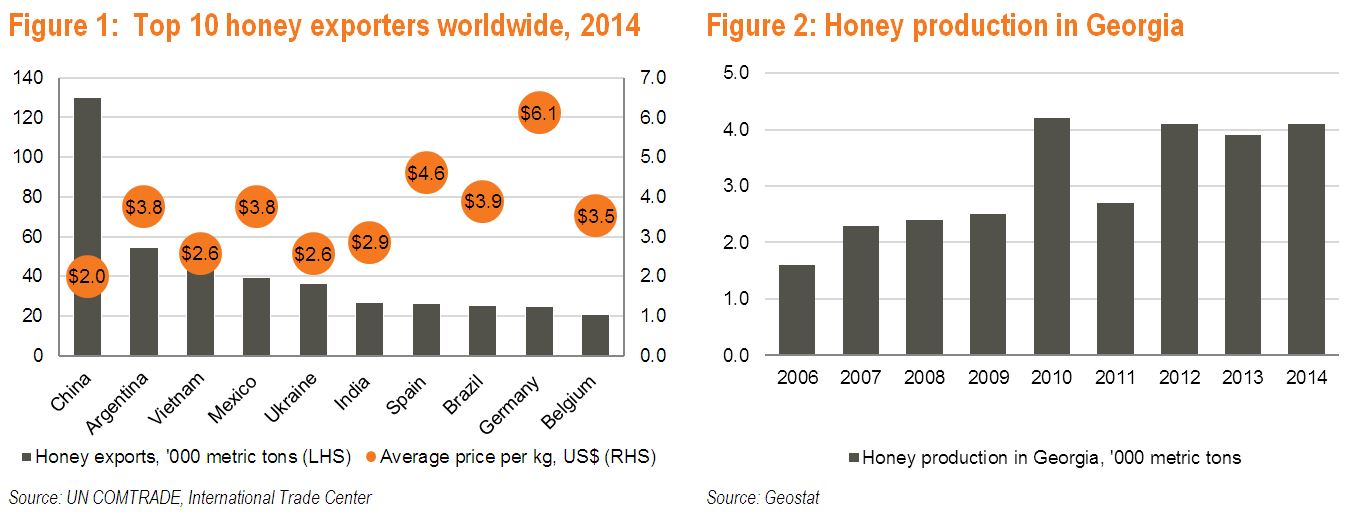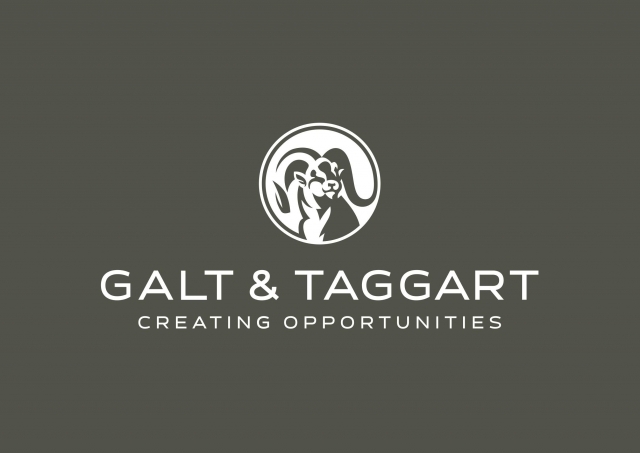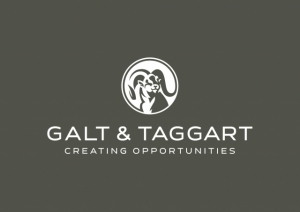Sweet Business – Growth Prospects for Georgian Honey
Georgian honey could soon appear on the shelves of European supermarkets. Honey is one of the few Georgian animal products, along with sea fish, that could meet EU phytosanitary requirements with relative ease, unlike meat and dairy products. The main concerns are antibiotics and traces of pesticides in honey, which are relatively easy for producers to eradicate.
In 2014, Georgia produced 4,100 metric tons of honey, but only exported 5, generating export revenue of US$ 54,000, with Saudi Arabia accounting for 87% of total exports, followed by China (10%), and the Republic of Korea (1%). While currently negligible, honey exports have the potential to expand in coming years, granted the local beekeepers scale up, increase efficiency, and comply with international certification standards. According to the Advisor to the Minister of Agriculture, up to 1,500 metric tons of honey can be exported to the EU under the DCFTA, which implies a potential $10mn in annual export revenue.
Georgian honey will face tough price competition on foreign markets. International players such as China, Argentina, Vietnam, Mexico, and Ukraine dominate the global honey trade. Average price of Chinese honey on the European market is EUR 2/kg, while honey from Argentina and Mexico is sold for EUR 3/kg on average. Local retail price of Georgian honey is significantly higher (~EUR 6.5/kg), while exported Georgian honey commanded an average price of EUR 8.1/kg in 2014.

According to Juan Echanove, EU attaché for agriculture, food safety, and rural development, Georgian honey could still find its place on the European market despite the higher price tag. To that end, the country’s long history of beekeeping and unique characteristics of the Georgian product must be leveraged in the eyes of the European consumer. Renowned as the cradle of wine, Georgia is also the birthplace of honey. After a recent discovery in Sakire, Southern Georgia, archaeologists declared that the 5,500-year-old honey samples are, in fact, the world’s oldest. The Georgian honeybee is known for its long proboscis (tongue), allowing it to retrieve flower nectar from a depth that other honeybee breeds are unable to reach. Furthermore, Georgian flora is of rare diversity and the honey is packed with vitamins. Slovenia recently started commercializing beekeeping, has protected and trademarked its native bee, and is now marketing its trademarked product to visitors from around the world. Notably, the average price of Slovenian honey, directed mostly to the EU, was EUR 6.4/kg in 2014. Proper marketing of the Georgian honeybee and traditional beekeeping would go a long way toward justifying the price premium. With that said, Georgian beekeepers cannot count on the high price that their product commands in Saudi Arabia (~EUR 8/kg in 2014) to persist once they enter the European market. Efficiency gains will be necessary to bring down costs and increase competitiveness.
Almost 100% of the honey produced in Georgia is produced by amateur beekeepers, who own less than 300 beehives (professional beekeeping minimum), and have no scale or financial capacity to implement best practices and increase efficiency, i.e yield per beehive. The Ministry of Agriculture has estimated the initial investment for a 300 colony beekeeping business to be GEL 120,000, with a 4 year payback period. Commercial beekeeping provides higher yields and allows for a broader choice of bee products that beekeepers can offer the consumer. There is a demand on the market for pollen, royal jelly (bee milk), propolis, beeswax, and bee venom. These products are used for various medicinal purposes and are widely marketed for their health benefits.
Individual local beekeepers in Georgia are unable to provide honey in amounts that would interest international buyers. Furthermore, in some cases, importers require honey to be monofloral, meaning the honey should be predominantly from the nectar of one plant species, which is typically not the case with Georgian honey. Donor assistance is provided to local beekeepers to advance their skills and gain awareness of international markets and modern technologies in beekeeping. The Ministry of Agriculture is currently co-financing a beehive census for better tracking of Georgian honey and its point of origin. The ministry is also fully subsidizing the costs of honey sample analysis at the local state-sponsored laboratory through the end of December 2015. Importantly, the laboratory is currently not equipped to test for antibiotic and pesticide residues – a requirement under EU regulations (EC 37/2010); samples have to be sent abroad for such testing. It is expected that the laboratory will have such capability by the end of 2015.
Bees also play an important role in ensuring the survival of humanity. About one third of the human diet is derived from insect-pollinated plants, with honeybees responsible for 80% of this pollination. Pollination services provided by the beekeepers are extremely important for the production of certain crops. According to estimates by the US Department of Agriculture, average pollination fee in 2006 in the US was US$136/colony. In countries where there are not enough insects or colonies keep dying, e.g. China, pollination services are performed by humans and are naturally associated with sizable costs and human resources. This opens up a window of opportunity for beekeepers and farmers to cooperate. Blueberries, for example, benefit a great deal from the pollination services provided by bees.
Current conditions in the beekeeping industry are far from perfect, but the potential is there to be explored. If the points of weakness are addressed, Georgian honey could become a niche product and penetrate new markets. Georgia needs a well-equipped, accredited laboratory capable of conducting the tests necessary for product certification in compliance with EU standards; scaling the production will support growth in yields, which are currently significantly below industry standards; and implementation of new technologies and improvement of beekeepers’ skills will further strengthen the sector’s competitiveness.
Tamara Kurdadze (Galt and Taggart)











